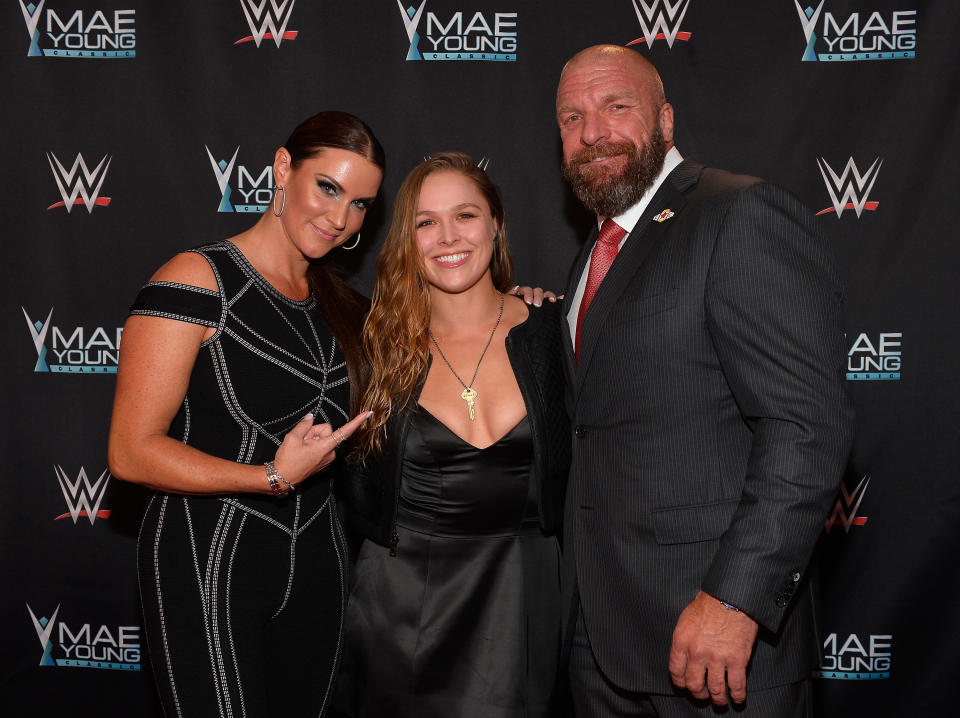WWE exec Paul 'Triple H' Levesque gives theory on Ronda Rousey's tough UFC ending

LAS VEGAS — When Ronda Rousey’s UFC run came to an end following a first-round knockout loss to Amanda Nunes in a bantamweight title fight in the main event of UFC 207 at T-Mobile Arena, she was more than ready to put mixed martial arts behind her forever.
After a meteoric rise in which she became one of the hottest names in sports and was on the cover of Sports Illustrated and dubbed as the world’s most dominant athlete, Rousey lost her final two fights. She was upset by Holly Holm and stopped in the second round of their bout at UFC 193, and then was blown out by Nunes at UFC 207.
It was a sudden, swift ending to a remarkable career. But when Rousey left, she seemed bitter. One of the best and most engaging interviews in the history of the UFC, Rousey would not agree to fight Nunes until UFC president Dana White promised she didn’t have to do media to promote the fight.
The mean mug she became famous for during her ring walks at the height of her success in the UFC, when she was winning bouts in handfuls of seconds, was the look on her face more often than not when she was in an MMA environment after those losses.
Paul “Triple H” Levesque, the WWE’s executive vice president of talent, live events and creative and the man who helped engineer Rousey’s move to the WWE, offered a theory about why it ended the way it did for Rousey in MMA.
Levesque, who said he expects Rousey to return to wrestling at some point, said Rousey played a character when she was selling her fights in the UFC. She is intelligent and quick-witted and was a natural during interviews with MMA reporters.
That Rousey became the real one to nearly everyone associated with MMA.
“I think one of the things that hurt Ronda, and I mean hurt her emotionally, is that she put on a persona to fight much like what we do,” Levesque said. “And again, she grew up as a fan and kind of did the [Floyd] Mayweather [thing] and put on this persona. She went all in with it but nobody could separate the two.
“She was judged by that. But also, you have to look at the human being. When you’re a little kid and your Mom (Ann Maria DeMars) is waking you up in the middle of the night and is putting an arm bar on you so you can try to figure out how to get out of it, there’s a different level of expectation. Second place was never an option. Even if she won, it was, ‘What were the failure points in that win?’ So the way she handled the reality of that and the theatrical of that blended and became this mishmash of stuff that was difficult to deal with.”
Levesque, who said Rousey was successful as a wrestler because she had great passion for the sport, met her at T-Mobile Arena for one of her first matches.
He caught her in a light moment and asked her about it. Her response spoke volumes to him.
“She walked in for one of her first shows with us and she was smiling as she walked into the room, kind of chuckling to herself,” Levesque said. “I said, ‘What’s funny?’ She said, ‘It’s the first time I walked into an arena like this and not hated everybody here. I’m not at combat with everyone. I walked in with my normal mentality and everyone was like, ‘Hi Ronda,’ with big smiles, and five seconds later I realized, everybody here is not against me.’ It became this enjoyable experience for her.
“She was like family. She never had that before. Her instinct was to walk in a building and every single person there was against her. Every single eye she looked at, every single person she ran up against, was a competitor to her, even the promotion. Everybody. It’s a whole different world and mindset. When you’re trying to talk about this, it’s different worlds and I don’t think, unless you went through it ... you can understand.”
In the UFC, when she’d snarl and make a sharp comment about an opponent or potential opponent, it carried real-life consequences. These were people with feelings and emotions who she might be in the cage with at some point.

She was selling and making the show bigger, but not everyone loved everything she had to say. It was an every-fighter-for-themself mentality, and Rousey knew the possibility existed she’d have to pay for her sharp words by taking a punch or a kick.
In the WWE, the character and the real person are easily separated and she was able to deal with that easier.
“Here, it was a show,” Levesque said. “Here, she was eliciting a response and everybody knew she was eliciting a response and she actually got great enjoyment out of eliciting a response by making it like she was breaking down the wall of the response she was trying to elicit. It became this game, right, and she loved it.”
Levesque said he’s in frequent touch with Rousey and she is pitching ideas to him about her eventual return. She hasn’t competed since WrestleMania 35 in April because she wanted to start a family with her husband, ex-UFC heavyweight Travis Browne.
More from Yahoo Sports:

 Yahoo Lifestyle
Yahoo Lifestyle 
